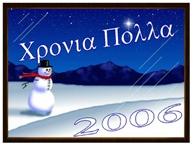 ΚΑΛA ΧΡΙΣΤΟYΓΕΝΝΑ ΚΑΙ
ΕΥΤΥΧΙΣΜEΝΟΣ Ο ΚΑΙΝΟYΡΓΙΟΣ ΧΡΟΝΟΣ!
ΚΑΛA ΧΡΙΣΤΟYΓΕΝΝΑ ΚΑΙ
ΕΥΤΥΧΙΣΜEΝΟΣ Ο ΚΑΙΝΟYΡΓΙΟΣ ΧΡΟΝΟΣ!
(Καλά Χριστούγεννα και Ευτυχισμένος ο Καινούργιος
Χρόνος!)
Happy Christmas and a Merry
New Year
You are likely to see this full greeting on cards. On more traditional
cards it may end in "Ευτυχισμένο το Νεο Ετος"
(ΕΥΤΥΧΙΣΜΕΝΟ ΤΟ ΝΕΟ ΕΤΟΣ) which is still "Merry New Year", but in a more old fashioned form.
Of course that's all a bit of a mouthfull so it's probably easier to stick
with either "Καλά Χριστούγεννα" (ΚΑΛΑ
ΧΡΙΣΤΟΥΓΕΝΝΑ) for Happy Christmas or you can use, "Χρονιά
Πολλά!" (ΧΡΟΝΙΑ ΠΟΛΛΑ) which is the equivalent of "Many Happy Returns" when you're saying it. You can
also say "Καλή Χρονιά" (ΚΑΛΗ
ΧΡΟΝΙΑ) for "Happy New Year".
You may also see "Θερμές/Θερμότατες Ευχές"
(ΘΕΡΜΕΣ/ΘΕΡΜΟΤΑΤΕΣ ΕΥΧΕΣ) which means "Warm/Warmest Wishes".
Here's a bit more vocabulary associated with Christmas:
| Upper |
Lower |
English |
| ΠΑΡΑΜΟΝΗ ΧΡΙΣΤΟΥΓΕΝΝΩΝ |
παραμονή χριστουγέννων |
Christmas Eve |
| ΠΑΡΑΜΟΝΗ ΠΡΩΤΟΧΡΟΝΙΑΣ |
παραμονή πρωτοχρονιάς |
New Year's Eve |
| ΧΡΙΣΤΟΥΓΕΝΝΙΑΤΙΚΟ ΔΕΝΔΡΟ |
χριστουγεννιάτικο δένδρο |
Christmas Tree |
| ΑΓΙΟΣ ΒΑΣΙΛΗΣ |
άγιος βασίλης |
Father Christmas (lit. Saint Basil) |
| ΚΑΛΑΝΤΑ |
κάλαντα |
Carols |
| ΓΑΛΟΠΟΥΛΑ |
γαλοπούλα |
Turkey |
The above covered the kind of messages you might use at Christmas and see
inside a card, but you would also need to add the usual personal comments when
sending a card to someone. So here are some greetings and comments to use. And
remember a greeting is for life - not just for Christmas, so these can be used
where appropriate for all sorts of cards and letters.
In Greece the words equivalent to our "dear" and "dearest" both come from the
Greek word for love (αγάπη/ΑΓΑΠΗ).
| English |
Lower |
Upper |
| Dear |
αγαπητ(ή/έ/οί) |
ΑΓΑΠΗΤ(Η/Ε/ΟΙ) |
| Dearest |
αγαπημέν(η/ε/οι) |
ΑΓΑΠΗΜΕΝ(Η/Ε/ΟΙ) |
The endings on these are in the order of Fem/Masc/Plural -
note the last one is plural, not Neuter as the recipient of the card will
always be either male female or a group - you should never be sending a card
to an "it"!
In Greece αγαπημέν(η/ε/οι) - ΑΓΑΠΗΜΕΝ(Η/Ε/ΟΙ) is more
often used for the immediate close family, whilst
αγαπητ(η/ε/οι) - ΑΓΑΠΗΤ(Η/Ε/ΟΙ) would be
used for friends and more distant relations.
If the card does not already contain the words you want you can always add
them yourself (see previous post) and perhaps use "σου/σας
έυχομαι..." (ΣΟΥ/ΣΑΣ
ΕΥΧΟΜΑΙ...) to say "I wish you ..." in front. If the card is from two
of you the plural (we wish you) would be "σου/σας
ευχόμαστε" (ΣΟΥ/ΣΑΣ
ΕΥΧΟΜΑΣΤΕ).
And perhaps sign off the card with:
| English |
Lower |
Upper |
| with love |
με αγάπη |
ΜΕ ΑΓΑΠΗ |
| lots of love |
με πολή αγάπη |
ΜΕ ΠΟΛΗ ΑΓΑΠΗ |
| regards |
χαιρετισμούς |
ΧΑΙΡΕΤΙΣΜΟΥΣ |
